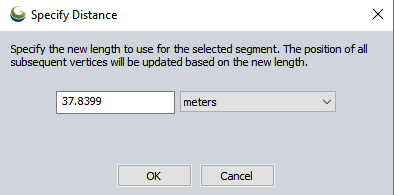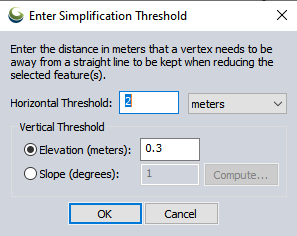In Global Mapper is it possible to the shape of area and line features
in several different ways. For many of the reshaping operations, the vertices must be visible or selected in order to make the modification. Enable the  Show
Area and Line Vertices option (Shift+V is a keyboard shortcut to toggle
this setting) to facilitate access to the features described below. Alternately enable the option Always Render Vertices for Selected Features to only show the vertices when a feature is selected.
Show
Area and Line Vertices option (Shift+V is a keyboard shortcut to toggle
this setting) to facilitate access to the features described below. Alternately enable the option Always Render Vertices for Selected Features to only show the vertices when a feature is selected.
Select the vertices to work with before performing any of the described operations (except inserting new vertices). Many of these tools will also work with mesh / 3D model features.
Shift+V: show area and line vertices
To access options for reshaping area and line features, select the vertices with the  Digitizer tool and right-click anywhere on the map to the Move/Reshape Feature or Vertex Editing sub-menus.
Digitizer tool and right-click anywhere on the map to the Move/Reshape Feature or Vertex Editing sub-menus.
The following options are available for reshaping area and line features:
Edit Length of Area and Line Feature Segments
With the  Digitizer tool and right-click anywhere on the map to the Move/Reshape Feature and select Edit Length of Area or Line Feature Segments.
Digitizer tool and right-click anywhere on the map to the Move/Reshape Feature and select Edit Length of Area or Line Feature Segments.
This option enable a segment editing mode. The cursor will change to show a  LEN symbol. Click on a segment of an area, line, or mesh feature to modify the length of the segment.
LEN symbol. Click on a segment of an area, line, or mesh feature to modify the length of the segment.

Specify a new length and press OK. All vertex locations from the selected segment to the end of the line / feature will be adjusted to make the clicked-on segment the specified length.
If the option Render segment lengths on map is enabled
in the Vector Display section of
the Configuration dialog then you can just double-click on a segment to
edit its length.
Always Render Vertices for Selected Features
This option specifies whether each vertex along area and line features selected with the Digitizer/ Edit Tool should be displayed.
Access this option from the Vector Rendering Configuration or by right-clicking with the  Digitizer tool and going to Options.
Digitizer tool and going to Options.
Use this option, rather than the Show Area and Line Vertices option above, to only display vertices for features that you are actively editing in order to prevent excessive clutter on the map.
 Move Selected Vertices
Move Selected Vertices
This option allows you to move selected vertices to a new location. To do this, hold down the left mouse button and move the vertices to the desired location, then release the left mouse button.
Note: While moving a single vertex, you can use the Snapping feature to help align the vertex with existing features.
If you'd only like to move the selected vertices either horizontally or vertically, you can hold down either the 'X' or 'Y' keys on the keyboard to restrict the movement to that axis. Holding down both keys will move the vertices diagonally.
Join Selected Vertices
This option allows you to set multiple vertices to the same location, which ensures that there are no gaps along the seams of features.
Select two or more vertices, then find this option in the context menu or the Digitizer menu under Move/ Reshape Features or Vertex Editing. Once selected the cursor will display the  move icon. Click or click and drag to place the location of the new vertex that merges all the selected vertices together.
move icon. Click or click and drag to place the location of the new vertex that merges all the selected vertices together.
Note: While joining vertices, you can use the Snapping feature to help align the vertex with existing features.
Delete Selected Vertices
This option allows you to delete the selected vertices. This action can be performed on selected vector or mesh /3d model vertices.
CTRL+Delete is the hot key for deleting selected vertices.
Set Position of Selected Vertices
This option displays a dialog allowing you to manually position the selected vertices by entering their new position in either latitude/ longitude coordinates or coordinates in the currently configured view projection/ datum. If the selected vertices are from a 3D line or area feature, you will also be able to set the elevation value to use for the vertex.
 Insert New Vertex
Insert New Vertex
This option allows you to insert a new vertex into the selected area or line feature. To insert the vertex, select the option from either the Move/Reshape Feature(s) or Vertex Editing Digitizer (right-click) sub-menus, or the Digitizer(Edit) toolbar button.
Left-click at the location where you want
the new vertex inserted. The vertex will be inserted on the area or line
feature at the clicked location along the nearest segment of the feature.
If the clicked location is closest to and end point, the line will be extended.
Alternately, if you hold down the SHIFT key while left-clicking the new
vertex will be placed on the selected feature(s) at the nearest location
to the click location. You can also use this feature to extend features.
The newly created vertices will be automatically selected. If you need
to add multiple vertices to the selected feature(s), simply hold down
the 'I' key when left-clicking to place the vertex and you will remain
in the insert vertex mode.
Reverse Order of Vertices in Selected Area(s)/Lines(s)
Reverses the
order of all vertices in a selected line or area feature. This option can be used for data management, but is also useful for Digitizer operations that relate to the beginning or ending or a feature.
Resample Selected Feature(s) at Specified Spacing
This option is found under the Move/ Reshape Feature(s) Options sub-menu and allows you to resample your selected area or line feature at a specified interval. This is useful if you want to add a lot of new vertices along your feature to make reprojection work better or to facilitate smoothing of the feature. See Split Features for more information.
Simplify Features
This option will automatically remove vertices that do not significantly contribute to the shape of your selected area or line features. This is useful to significantly reduce the size of features without giving up much detail in the shape.
Select Line or Area Features to simplify with the Digitizer tool and right-click. In the Move/ Reshape Feature(s) sub-menu, selected the SIMPLIFY - Simplify (Reduce) Vertices of Selected Line/ Area Feature(s) or Simplify Features option.
When selected the Enter Simplification Threshold dialog will appear
(pictured below).

Horizontal Threshold — Use this field to enter the threshold that will be used to simplify the 2D components of each vector feature. This is the distance that a vertex needs to be from a straight line in order to be kept in the feature. Vertices that are this distance or further from the straight line will be kept. Vertices that are closer than this distance from the straight line will be discarded.
Vertical Threshold — This section applies only to 3D data. The threshold specified here will be applied to the vertex elevations. If the calculation exceeds the threshold, then the vertex will be kept.
Elevation (meters) — This field to specifies a threshold for the elevation difference between vertices. If the elevation difference is greater than or equal to the threshold, the vertex will be kept.
Slope (degrees) — This field to specifies a threshold for the slope difference between vertices. Each calculation involves three points (A, B, and C). If the difference between slope AC and slope AB exceeds the threshold, and the difference between slope AC and slope BC exceeds the threshold, then the point will be kept. Specify this value in degrees.
If you need to use a different means to specify the slope, click on the Compute... button. Global Mapper will display a dialog that will allow you to enter the value using raw slope (rise over run) and a "1 in X" designation. The dialog will then convert this value to degrees and enter it in the Slope field.
Smooth Selected Line/ Area Feature(s)
This option will modify the position of the vertices of the selected line and area features to smooth the appearance. This can be used to give jagged contour lines a better appearance. Smoothing will add additional vertices to approach a smoother curve to the line or area boundary. This operation can be performed repeatedly to achieve the desired effect.